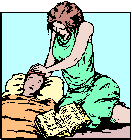Meningococcal Infection

Meningitis is an inflammation of the lining of the brain and has many causes including bacterial, viral, fungal and parasitic. A particular bacterium called "meningococcus" can be aggressive and lead very quickly to a life threatening illness. Meningococcus causes epidemics of meningitis especially in some countries in Africa (across the meningitis belt) and some parts of Asia and South America. There are multiple strains
(sub-types) of meningococcal bacteria, and these may differ from country to country.
How Do You Catch It?
The bacteria enter the body through the upper respiratory tract. The bacteria can be caught by inhalation (e.g. when an infected person coughs or sneezes on someone), by direct mouth to mouth contact with an infected person, or by indirect contact (e.g. by touching one's nose after touching an object that is contaminated by an infected person's nasal secretions).
Meningococcus does no harm at all in most people. In some people, however - especially children less than 5 years old and young healthy adults - serious infections can occur, especially when a new strain in encountered. The incubation period is 1 to 10 days. The bacteria are particularly attracted to the lining of the brain, and can travel up into the small vessels inside the brain's lining and deposit there. The symptoms of meningitis then begin with a severe headache and high fever, progressing to drowsiness, confusion and seizures. Neck stiffness, vomiting and a rash are other features. Meningococcal meningitis can be treated successfully with antibiotics if the infection is recognised in its early stages, but it is possible for serious illness or death to occur within 24 – 48 hours. If you are travelling in an area away from medical care, it may be important to arrange vaccination. If possible, avoid crowded areas such as public transport and market places as people may cough and sneeze in close proximity, increasing your risk of exposure to bacteria.
Disease Risk

The disease is most common in poor and overcrowded areas and increases in the winter and spring. Epidemics occur frequently in the Sub-Saharan "meningitis belt" across the middle of Africa, especially during December to June. It also occurs on an irregular basis in other countries. Common strains overseas are A, C, W and Y.
In Australia there are a handful of severe cases of meningococcal infection each year. Here in Western Australia the majority of cases are due to the Meningococcal strains B and C.
Places where travellers should be aware of the possibility of being exposed to meningococcal infection include the following:
COUNTRIES | |
Angola | Kenya |
Benin | Mali |
Burkina Faso | Mauritania |
Burundi | Niger |
Cameroon | Nigeria |
Central African Republic | Rwanda |
Chad | Saudia Arabia (see below *) |
Cote D'Ivoire | Senegal |
Democratic Republic of the Congo | Somalia |
Djibouti | South Sudan |
Eritrea | Sudan |
Ethiopia | Tanzania |
Gambia | Togo |
Ghana | Uganda |
Guinea | Zaire |
Guinea-Bissau | |
*All pilgrimage visitors to Saudi Arabia are required by law to have Meningitis vaccine prior to travel
How Can You Avoid Meningococcal Meningitis?

Meningococcal meningitis is preventable by vaccination.
- For travellers there is a vaccine that offers approximately 85-90% protection against meningococcal meningitis strains A, C, Wand Y (the most common strains overseas are A & C).
- The vaccine takes 10 days to become effective, and remains effective for 3-5 years, depend on which brand is chosen.
- Side effects are uncommon and usually mild, e.g. tenderness and redness at the site of injection for 1 to 2 days. Up to 2% of children develop a fever that comes and goes, and may become a bit irritable.
- Occasionally people suffer a mild headache, neck stiffness and muscular pain within 48 hours of vaccination, which can be easily treated with paracetamol or nurofen.
- There are vaccines which cover the group C strain only, and these vaccines will remain effective for probably at least 20 years. There is a free government program for young children and adolescents using this vaccine, and we can also provide this to those at risk.
- There is also a new meningococcal B vaccine licensed in Australia from 2014, which we can provide to those at risk. This is not currently subsidised by the government.
If possible stay away from crowded areas frequented by local inhabitants, avoid other close physical contact and be diligent with hand washing. Seek medical advice at once if you are concerned that you may have contracted meningococcal infection.
Updated August 2021.


